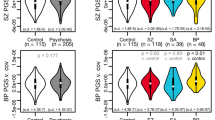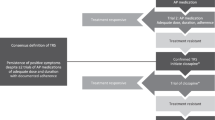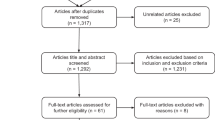Abstract
Brain-derived neurotrophic factor (BDNF) plays an important role in dopaminergic and serotonergic neurotransmission by modulating dopaminergic neuron differentiation and establishment. Multiple studies have analyzed the functional BDNF Val66Met variant in relation to antipsychotic response in schizophrenia (SCZ) patients, yielding mixed results. A meta-analysis was thus performed to examine the relationship between this variant and symptom improvement during antipsychotic treatment. Searches using PubMed, Web of Science, and PsycInfo until October 2017 yielded 11 studies that met inclusion criteria (total n = 3774). These studies investigated the BDNF Val66Met variant and antipsychotic response in patients with SCZ or schizoaffective disorder. Responders to antipsychotics were defined using the original criteria applied in each study. Effect sizes were computed using odds ratios, which were pooled according to the Mantel–Haenszel method. The BDNF Val66Met variant was not associated with the total number of responders and non-responders (p > 0.05) under dominant, recessive, or allelic models. Secondary analyses stratifying for individuals of each ethnicity and drug type also revealed no significant associations. Our findings suggest that the BDNF Val66Met variant is not associated with response to antipsychotics in individuals with SCZ. However, considering the current sample size, small effects cannot be ruled out. Moreover, recent studies have suggested that Val66Met forms haplotypes with other BDNF variants. Future studies should examine the Val66Met variant in conjunction with these other variants in relation to antipsychotic response. Moreover, since illness duration appears to influence BDNF levels in SCZ patients, future studies should aim to control for this potential confounding factor in response analyses.
This is a preview of subscription content, access via your institution
Access options
Subscribe to this journal
Receive 6 print issues and online access
$259.00 per year
only $43.17 per issue
Buy this article
- Purchase on Springer Link
- Instant access to full article PDF
Prices may be subject to local taxes which are calculated during checkout





Similar content being viewed by others
References
Arranz MJ, Rivera M, Munro JC. Pharmacogenetics of response to antipsychotics in patients with schizophrenia. CNS Drugs. 2011;25:933–69.
Sriretnakumar V, Huang E, Müller DJ. Pharmacogenetics of clozapine treatment response and side-effects in schizophrenia: an update. Expert Opin Drug Metab Toxicol. 2015;11:1709–31.
Arranz MJ, de Leon J. Pharmacogenetics and pharmacogenomics of schizophrenia: a review of last decade of research. Mol Psychiatry. 2007;12:707–47.
Vojvoda D, Grimmell K, Sernyak M. Monozygotic twins concordant for response to clozapine. Lancet. 1996;347:61.
Mata I, Madoz V, Arranz MJ, Sham P, Murray RM. Olanzapine: concordant response in monozygotic twins with schizophrenia. Br J Psychiatry. 2001;178:86.
Müller DJ, Schulze TG, Knapp M, Held T, Krauss H, Weber T, et al. Familial occurrence of tardive dyskinesia. Acta Psychiatr Scand. 2001;104:375–99.
Wehmeier PM, Gebhardt S, Schmidtke J, Remschmidt H, Hebebrand J, Theisen FM. Clozapine: weight gain in a pair of monozygotic twins concordant for schizophrenia and mild mental retardation. Psychiatry Res. 2005;133:273–6.
Jones KR, Reichardt LF. Molecular cloning of a human gene that is a member of the nerve growth factor family. Proc Natl Acad Sci USA. 1990;87:8060–4.
Studer L, Spenger C, Seiler RW, Altar CA, Lindsay RM, Hyman C. Comparison of the effects of the neurotrophins on the morphological structure of dopaminergic neurons in cultures of rat substantia nigra. Eur J Neurosci. 1995;7:223–33.
Baquet ZC, Bickford PC, Jones KR. Brain-derived neurotrophic factor is required for the establishment of the proper number of dopaminergic neurons in the substantia nigra pars compacta. J Neurosci. 2005;25:6251–9.
Notaras M, Hill R, van den Buuse M. The BDNF gene Val66Met polymorphism as a modifier of psychiatric disorder susceptibility: progress and controversy. Mol Psychiatry. 2015;20:916–30.
Zhang XY, Liang J, Xiu MH, De Yang F, Kosten TA, Kosten TR. Low BDNF is associated with cognitive impairment in chronic patients with schizophrenia. Psychopharmacol. 2012;222:277–84.
Zhang XY, Tan YL, Zhou DF, Cao LY, Wu GY, Xu Q, et al. Serum BDNF levels and weight gain in schizophrenic patients on long-term treatment with antipsychotics. J Psychiatr Res. 2007;41:997–1004.
Rizos EN, Papadopoulou A, Laskos E, Michalopoulou PG, Kastania A, Vasilopoulos D, et al. Reduced serum BDNF levels in patients with chronic schizophrenic disorder in relapse, who were treated with typical or atypical antipsychotics. World J Biol Psychiatry. 2008;10:1–5.
Lee JG, Cho HY, Park SW, Seo MK, Kim YH. Effects of olanzapine on brain-derived neurotrophic factor gene promoter activity in SH-SY5Y neuroblastoma cells. Prog Neuropsychopharmacol Biol Psychiatry. 2010;34:1001–6.
Lee BH, Kim YK. Increased plasma brain-derived neurotropic factor, not nerve growth factor-Beta, in schizophrenia patients with better response to risperidone treatment. Neuropsychobiology. 2009;59:51–58.
Grillo RW, Ottoni GL, Leke R, Souza DO, Portela LV, Lara DR. Reduced serum BDNF levels in schizophrenic patients on clozapine or typical antipsychotics. J Psychiatr Res. 2007;41:31–5.
Luoni A, Fumagalli F, Racagni G, Riva MA. Repeated aripiprazole treatment regulates Bdnf, Arc and Npas4 expression under basal condition as well as after an acute swim stress in the rat brain. Pharmacol Res. 2014;80:1–8.
Pandya CD, Hoda MN, Kutiyanawalla A, Buckley PF, Pillai A. Differential effects upon brain and serum BDNF levels in rats as response to continuous and intermittent administration strategies of two second generation antipsychotics. Schizophr Res. 2013;151:287–8.
Chen ZY, Patel PD, Sant G, Meng CX, Teng KK, Hempstead BL, et al. Variant brain-derived neurotrophic factor (BDNF)(Met66) alters the intracellular trafficking and activity-dependent secretion of wild-type BDNF in neurosecretory cells and cortical neurons. J Neurosci. 2004;24:4401–11.
Egan MF, Kojima M, Callicott JH, Goldberg TE, Kolachana BS, Bertolino A, et al. The BDNF val66met polymorphism affects activity-dependent secretion of BDNF and human memory and hippocampal function. Cell. 2003;112:257–69.
Hong CJ, Yu YW, Lin CH, Tsai SJ. An association study of a brain-derived neurotrophic factor Val66Met polymorphism and clozapine response of schizophrenic patients. Neurosci Lett. 2003;349:206–8.
Zai GC, Zai CC, Chowdhury NI, Tiwari AK, Souza RP, Lieberman JA, et al. The role of brain-derived neurotrophic factor (BDNF) gene variants in antipsychotic response and antipsychotic-induced weight gain. Prog Neuropsychopharmacol Biol Psychiatry. 2012;39:96–101.
Nikolac Perkovic M, Nedic Erjavec G, Zivkovic M, Sagud M, Uzun S, Mihaljevic-Peles A, et al. Association between the brain-derived neurotrophic factor Val66Met polymorphism and therapeutic response to olanzapine in schizophrenia patients. Psychopharmacol. 2014;231:3757–64.
Anttila S, Illi A, Kampman O, Mattila KM, Lehtimaki T, Leinonen E. Lack of association between two polymorphisms of brain-derived neurotrophic factor and response to typical neuroleptics. J Neural Transm. 2005;112:885–90.
Xu M, Li S, Xing Q, Gao R, Feng G, Lin Z, et al. Genetic variants in the BDNF gene and therapeutic response to risperidone in schizophrenia patients: a pharmacogenetic study. Eur J Hum Genet. 2010;18:707–12.
Pae CU, Chiesa A, Porcelli S, Han C, Patkar AA, Lee SJ, et al. Influence of BDNF variants on diagnosis and response to treatment in patients with major depression, bipolar disorder and schizophrenia. Neuropsychobiology. 2012;65:1–11.
Xu Q, Wu X, Li M, Huang H, Minica C, Yi Z, et al. Association studies of genomic variants with treatment response to risperidone, clozapine, quetiapine and chlorpromazine in the Chinese Han population. Pharm J. 2016;16:357–65.
Lieberman JA, Stroup TS, McEvoy JP, Swartz MS, Rosenheck RA, Perkins DO, et al. Effectiveness of antipsychotic drugs in patients with chronic schizophrenia. N Engl J Med. 2005;353:1209–23.
Serretti A, Kato M, De Ronchi D, Kinoshita T. Meta-analysis of serotonin transporter gene promoter polymorphism (5-HTTLPR) association with selective serotonin reuptake inhibitor efficacy in depressed patients. Mol Psychiatry. 2007;12:247–57.
Zhang JP, Lencz T, Malhotra AK. D2 receptor genetic variation and clinical response to antipsychotic drug treatment: a meta-analysis. Am J Psychiatry. 2010;167:763–72.
Mitjans M, Catalán R, Vázquez M, González-Rodríguez A, Penadés R, Pons A, et al. Hypothalamic–pituitary–adrenal system, neurotrophic factors and clozapine response: association with FKBP5 and NTRK2 genes. Pharm Genom. 2015;25:274–7.
Terzić T, Kastelic M, Dolžan V, Plesničar BK. Genetic variability testing of neurodevelopmental genes in schizophrenic patients. J Mol Neurosci. 2015;56:205–11.
Kaur H, Jajodia A, Grover S, Baghel R, Gupta M, Jain S, et al. Genetic variations of PIP4K2A confer vulnerability to poor antipsychotic response in severely ill schizophrenia patients. PLoS ONE. 2014;9:e102556.
Yoshimura R, Hori H, Ikenouchi-Sugita A, Umene-Nakano W, Katsuki A, Hayashi K, et al. Aripiprazole altered plasma levels of brain‐derived neurotrophic factor and catecholamine metabolites in first‐episode untreated Japanese schizophrenia patients. Human Psychopharmacol Clin Exp. 2012;27:33–8.
Cargnin S, Massarotti A, Terrazzino S. BDNF Val66Met and clinical response to antipsychotic drugs: a systematic review and meta-analysis. Eur Psychiatry. 2016;33:45–53.
Xu MQ, St Clair D, Feng GY, Lin ZG, He G, Li XW, et al. BDNF gene is a genetic risk factor for schizophrenia and is related to chlorpromazine-induced extrapyramidal syndrome in the Chinese population. Pharm Genom. 2008;18:449–57.
Fernandes BS, Steiner J, Berk M, Molendijk ML, Gonzalez-Pinto A, Turck CW, et al. Peripheral brain-derived neurotrophic factor in schizophrenia and the role of antipsychotics: meta-analysis and implications. Mol Psychiatry. 2015;20:1108–19.
Lopez JP, Mamdani F, Labonte B, Beaulieu MM, Yang JP, Berlim MT, et al. Epigenetic regulation of BDNF expression according to antidepressant response. Mol Psychiatry. 2013;18:398.
Zhang XY, Xiu MH, De Yang F, Wu GY, Lu L, Kosten TA, et al. Nicotine dependence and serum BDNF levels in male patients with schizophrenia. Psychopharmacol. 2010;212:301–7.
Lin Z, Su Y, Zhang C, Xing M, Ding W, Liao L, et al. The interaction of BDNF and NTRK2 gene increases the susceptibility of paranoid schizophrenia. PLoS ONE. 2013;8:e74264.
Acknowledgements
The principal investigators of the CATIE trial were Jeffrey A Lieberman, MD, T Scott Stroup, MD, MPH, and Joseph P McEvoy, MD. The CATIE trial was supported by a grant from the National Institute of Mental Health (N01 MH900001) and MH074027 (PI Patrick F Sullivan). Genotyping was funded by Eli Lilly and Company. CCZ is supported by the Brain and Behavior Research Foundation, American Foundation for Suicide Prevention, and Eli Lilly. EH is supported by the Canada Graduate Scholarship (CGS). JLK is supported by the CIHR grant “Strategies for gene discovery in schizophrenia: subphenotypes, deep sequencing and interaction”. GZ is supported by a CIHR postdoctoral fellowship. The remaining authors do not have any research support to disclose. The authors would like to acknowledge the contributions of DJM (Dr. Daniel J. Mueller) for his support. The authors have no further acknowledgements.
Funding
This work did not receive any direct funding support.
Author information
Authors and Affiliations
Corresponding author
Ethics declarations
Conflict of interest
JLK has acted as a consultant or received honoraria from GlaxoSmith-Kline, Sanofi-Aventis, Dainippon-Sumitomo, Novartis, Shire, Eli Lilly, and Roche; he is on a Scientific Advisory Board member (unpaid) of AssureRx Health Inc. The remaining authors have no potential conflicts of interests to disclose.
Electronic supplementary material
Rights and permissions
About this article
Cite this article
Huang, E., Hettige, N.C., Zai, G. et al. BDNF Val66Met polymorphism and clinical response to antipsychotic treatment in schizophrenia and schizoaffective disorder patients: a meta-analysis. Pharmacogenomics J 19, 269–276 (2019). https://doi.org/10.1038/s41397-018-0041-5
Received:
Revised:
Accepted:
Published:
Issue Date:
DOI: https://doi.org/10.1038/s41397-018-0041-5



